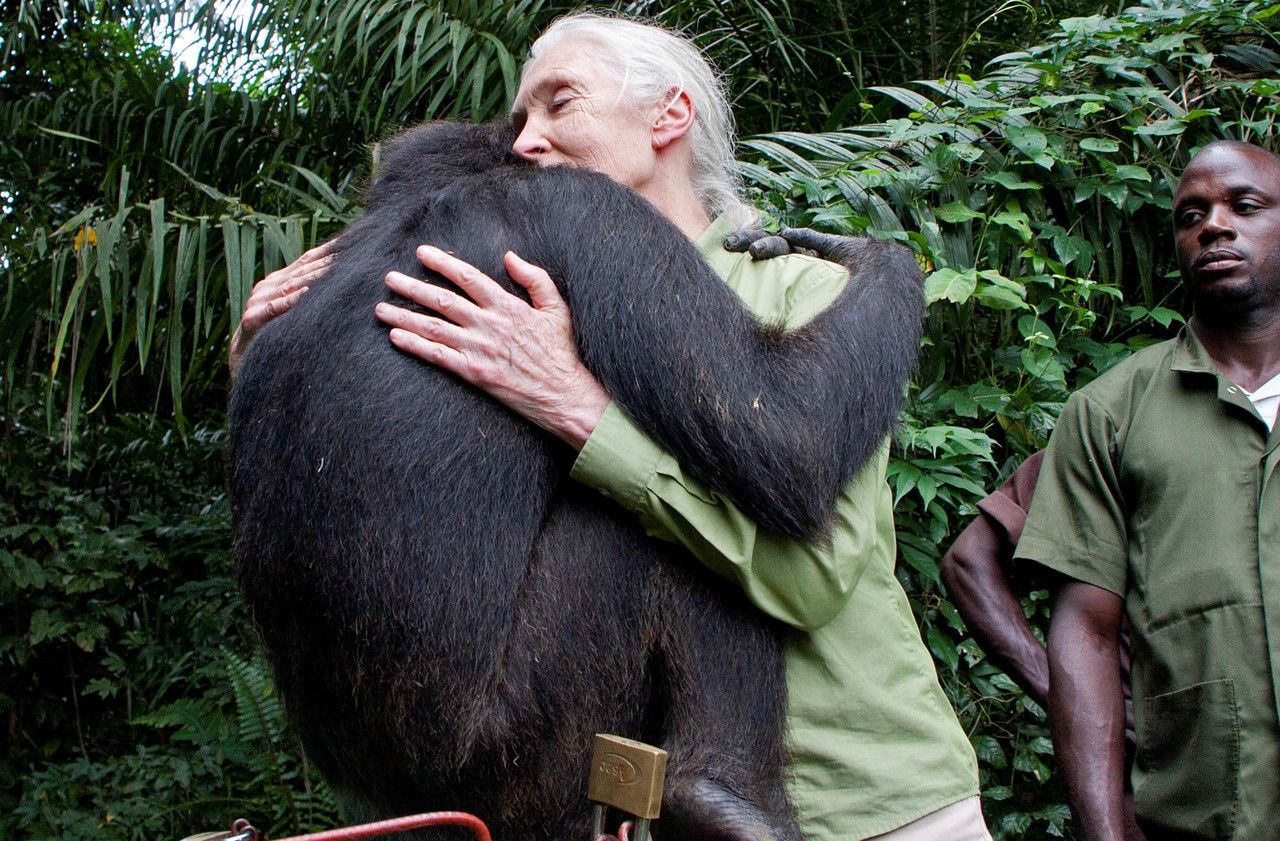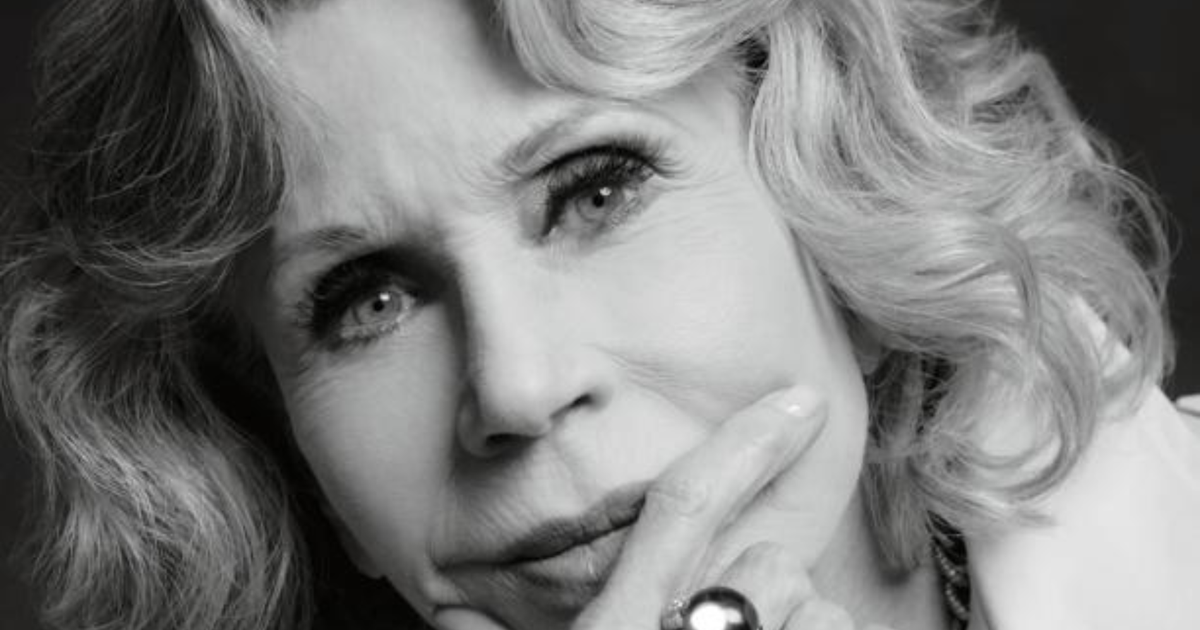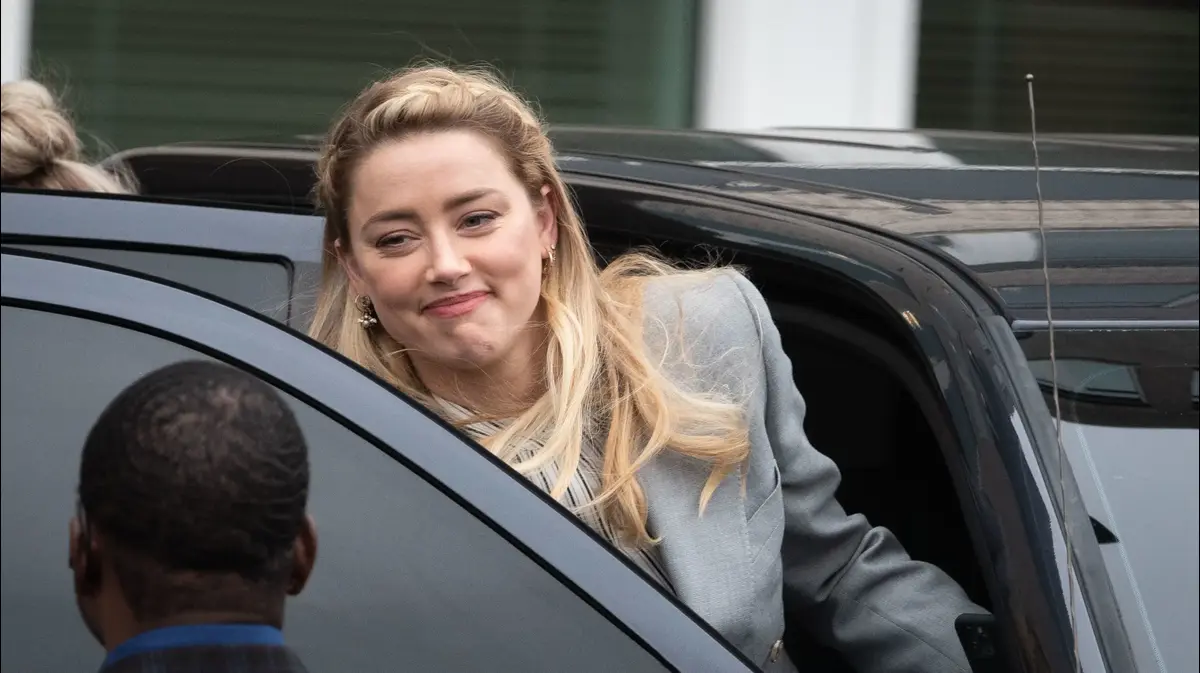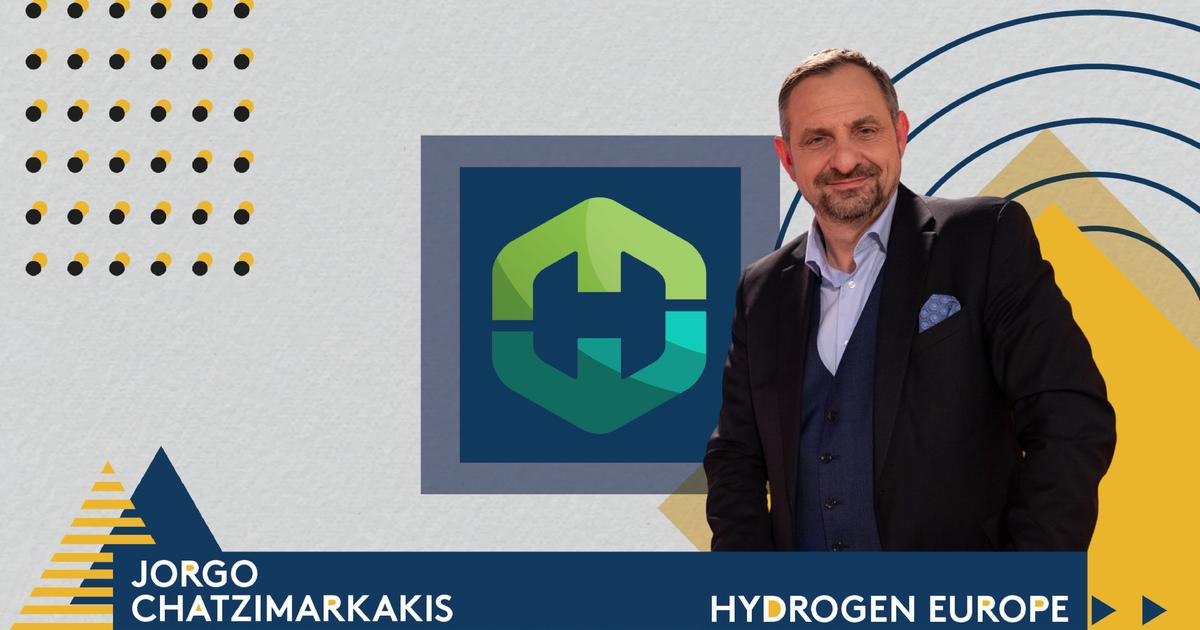The cold glow of its computer screen has replaced in recent months the heat of projectors in conference rooms around the world.
Used to traveling three hundred days a year to raise awareness, the 86-year-old activist had to resolve to stay at home, in England, because of the Covid-19 pandemic.
But for Jane Goodall, immobilization cannot rhyme with immobilization.
A red shawl thrown over his shoulders, this figure of the animal and environmental cause with the eternal ponytail has agreed to grant us a videoconference interview from his home in Bournemouth, in the south of the country.
Despite the distance, his green eyes overflowing with humanity still bear witness with as much intensity to his commitment and his desire to awaken consciences.
Behind her, in a frame placed on her bookcase, sits a photo, that of David Greybeard.
A Nobel in science?
Almost.
This chimpanzee, so nicknamed because of his gray beard ("gray beard", in English) allowed "Jane" to revolutionize our knowledge in ethology, the science of animal behavior.
It was by observing him harvesting termites using a carefully stripped twig that the 26-year-old young woman, who left alone on a mission in the Tanzanian jungle, understood that the commonly accepted definition of man came from shatter.
Impossible now to distinguish it from the animal by its ability to manufacture and use tools.
It was while observing the chimpanzee named David Greybeard, in Tanzania (here in 1965), that Jane Goodall discovered that the making and use of tools were not unique to humans.
Rue des Archives / BCA / CSU
Sixty years later, this pioneer continues to fight to preserve biodiversity thanks to her powerful foundation, created in 1977, the Jane Goodall Institute.
She has just published "Le Rêve de Jane" (3 books and 1 cd, L'Avion de papier, 19.90 euros), a trilogy intended for young people, and will, on March 24, 2021, be featured in the next documentary by Cyril Dion, "Animal".
You who are used to traveling the globe, how is our planet doing?
JANE GOODALL.
She is sick, very sick.
Probably more than we humans are due to Covid-19.
The pandemic is causing immense suffering, death, job loss, and disrupting economies around the world, but we are partly responsible.
We act as if natural resources are inexhaustible.
Some countries plunder them so avidly that biodiversity no longer has time to recover.
Should we change the model?
Yes, and quickly!
Our contempt for nature not only leads to climate change, but it also promotes the transmission of viruses and bacteria between animals and humans.
And the appearance of new diseases, such as Covid-19, SARS, this other terrible respiratory disease, Ebola or even HIV, spread by infected chimpanzee meat in Central Africa.
By dint of destroying their habitat, we push certain species to get closer to humans.
Worse, we export from one region to another, and even from one continent to another, billions of animals raised on unsanitary factory farms, but also wildlife, sold in tiny cages on the stalls. from Asia for traditional medicine, or as bushmeat in Africa.
When it's not to fuel the exotic pet market.
We treat animals as if they were only on Earth to be exploited, eaten, hunted ...
Newsletter My Earth
Every week, the environmental news seen by Le Parisien
I'm registering
Your email address is collected by Le Parisien to enable you to receive our news and commercial offers.
Learn more
In just forty years, 60% of wild species have disappeared.
Is the pandemic likely to further accelerate this collapse?
Unfortunately, yes.
Tourism has collapsed in some regions.
In places, there is therefore no longer enough money to pay the salaries of rangers in national parks.
Elephants and rhinos, hunted for their ivory, are less well protected.
International cartels are taking advantage, poaching has increased.
In addition, the inhabitants, deprived of income, hunt for food and cut down trees to sell charcoal.
In developed countries, spring containment has had beneficial effects, however ...
Yes, when a country is confined, there is less industrial activity, less traffic on the roads.
For the first time, residents of large cities were able to breathe unpolluted air and enjoy clear skies.
Animals have also reclaimed the city.
In America, for example, coyotes have been seen roaming the streets.
But all this is unfortunately temporary, because many politicians, so anxious to return "to normal", think only of reviving the economy at all costs.
Yet we know that, coming out of the pandemic, we will have to face a climate crisis, with increasingly violent hurricanes and typhoons, severe flooding, but also terrible droughts and monstrous forest fires, such as those which ravaged Australia or the western United States recently.
The melting of polar ice, rising sea levels, the extinction of animal and plant species… All this happens so quickly!
If we continue on this path, that will be the end.
Not just wildlife, but humanity.
Should we abandon the market economy?
Until now, economic development has almost always taken precedence over safeguarding the environment.
However, in many cases, the latter must prevail over the construction of such and such a road, such a dam or such a shopping center.
We have to think about future generations, about what will happen to our great-grandchildren.
We need to create a society where making money is not the only goal.
We must find a new path, that of a green economy.
Jane Goodall was received by Nicolas Hulot in January 2018, when he was Minister of the Ecological Transition.
Francois Lafite / Sipa
You say we all have a role to play.
Individually, what can we do?
Think about the consequences of our actions.
Ask us before buying.
Are these clothes cheap because they are made by children or adults who barely earn enough to survive each day?
Did this vegetable require a lot of pesticides?
Does this piece of meat come from an animal killed in suffering?
What message would you like to send in our magazine?
I have been a vegetarian for over fifty years.
Eating less or no animal flesh is probably one of the best things we can do to protect the environment.
Because intensive agriculture intended to feed farm animals represents an ecological disaster.
It takes astronomical amounts of fresh water, and clearing more and more land to grow grain.
Not to mention the methane emitted by livestock, one of the main greenhouse gases, which contributes to global warming.
I have seen entire forests become savannas because of animal husbandry, in Africa, in Latin America… If billions of us make more ethical choices, the planet will be better off.
The climate marches have mobilized young people around the world.
Is the new generation more lucid?
In my childhood, the urgency was not the same, the speech either.
Young people today are much more aware of the ills of our planet and the problems people face because they receive a different education.
Many awareness-raising organizations like ours, or the L214 animal rights association, for example, are helping to gradually change mentalities.
You seem to have more faith in the youth than in our leaders ...
Politicians are elected by the people, at least in a democracy.
They will only change if opinion changes.
And then, working with young people around the world changes parents' attitudes.
Which sometimes themselves occupy decision-making positions, in business as in politics.
US Democrat Joe Biden has promised to ratify the Paris Agreement again.
What do you think about his election to the presidency?
Thanks to unprecedented popular mobilization, more than 150 million people voted in the US presidential election, in the midst of a pandemic.
This is the highest level of participation ever.
Democracy is the foundation of our ability to live in harmony with one another and with the natural world.
So congratulations to America.
At 86, you are considered an icon.
Who are, according to you, the figures of tomorrow's ecology?
In our environmental and humanitarian education program Roots & Shoots, we have more than 700,000 young people - preschoolers, high school students, students in 65 countries - who are thinking about solutions future and act with passion.
They clean up the oceans, help homeless children, fight against deforestation… Thanks to the support of the foundation of the French furniture and decoration brand Maisons du Monde, they will, for example, be planting from next January 1,2 million trees in Tanzania and 12,000 in France.
Some of these young people are undoubtedly the leaders of tomorrow.
Through her Roots and Shoots educational program, Jane Goodall has been raising awareness among young people since 1991 (here in New Zealand).
Robert ratzer
Your foundation, the Jane Goodall Institute, studies the behavior of chimpanzees, but not only ...
In Africa, where 70% of great apes have disappeared in fifty years and where the rate of deforestation is twice the global average, we are also working with local communities to make them partners in biodiversity conservation. .
We help them find sustainable ways to make a living without destroying their forests, without killing animals.
We also provide them with cell phones to report illegal logging or suspicious movements.
All this information is centralized on the collaborative platform “Global Forest Watch” (monitoring of the world's forests, in French).
Your education programs are especially aimed at young girls.
Why ?
Girls in Africa and developing countries are often forced to work in the household and in the fields.
We want to give them a chance to receive the same education as the boys.
In South America, a tribal chief once told me:
Jane, our community is like an eagle with one wing male and the other female.
We can only fly high if the two are equal
.
I agree.
Has being a woman been an asset or a handicap in your career?
An advantage.
When I left school, I didn't have enough money to go to college.
I saved up to go to Kenya, where I met the famous paleontologist Louis Leakey, who suggested that I go study chimpanzees in Tanzania.
He later told me that he had chosen me because I had been passionate about African animals since I was 10, and my mind was not formatted by scientific studies, but also because I was a woman.
He thought I would have more patience.
Your beauty drew a lot of comments at the beginning.
Did that irritate you?
If I had been ugly, I might not have received the same attention, it's true.
But if my legs have allowed me to raise money to do what I am passionate about and discover amazing things about chimpanzees, I thank them!
I was only considered a real scientist after I got my doctorate.
Jane Goodall lived for many years among the chimpanzees of the Tanzanian jungle, until forming links with them (here in 1972).
Bettmann / Getty
Your work has redefined the boundaries between humans and animals.
What do we know about chimpanzees today?
We share 98.6% of our DNA with them.
The anatomy of our brains and immune systems are similar and our communication is the same.
Like us, chimps express emotions, such as happiness, sadness, hopelessness, anger, resentment, fear and pain.
They can be loving, compassionate and altruistic: they kiss, hug, hold hands, caress ... And can be violent, brutal, and wage a kind of primitive war for domination.
What sets us apart from them?
Chimpanzees are very, very intelligent.
But we are able to send rockets to the moon or to Mars, and to communicate with the whole world thanks to electronics.
Probably because we have developed a language - words - which allows us to project ourselves into the distant future, to teach children abstract things.
This is our biggest difference.
Our little ones don't need to learn by watching.
They can do it by listening, by reading.
But despite the extent of our intellectual faculties, we are destroying our only home, the Earth.
We have lost the wisdom to think long term.
What moment shared with chimpanzees moved you the most?
The first time Flo, a female, allowed her 4 month old Flint to touch my hand and my nose was a wonderful time for me.
She was a little nervous, kept a hand on him… but she obviously trusted me finally, after having run away from me for four months.
In 2013, Wounda returned to the Congolese jungle after being treated for months.
Fernando Turmo / Jane Goodall Institute
You claim that these monkeys made you a better mother.
What did they teach you?
Well, the most important thing in the first two years of life is to have support.
Not necessarily that of the biological mother, but that, constant, of two or three individuals.
The little ones who have benefited from it have evolved better.
We have verified this on four generations of chimpanzees.
So, I played a lot with my son, Grub, and never left him for a single night before he was 3 years old.
You often say that there are two Janes: the icon and you.
Does the “real” Jane ever regret having to then move away from her family to stay with the chimpanzees and raise awareness?
No, because I think my destiny is to act.
Even though sometimes I get frustrated at having to struggle to raise funds, to find that I speak to people who don't seem to understand what we are doing to the planet, and especially to see that things are changing too slowly.
The ethologist (here in 2010 in Geneva) has been the United Nations messenger of peace since 2002. Salvatore Di Nolfi / EPA / MAXPPP
In France, the government will eventually ban wild animals in circuses.
Should we also abolish zoos?
Elephants, whales, dolphins, polar bears should not be in captivity.
Yet so many people tell me that it was in zoos that they fell in love with animals!
It is difficult to decide.
Especially since certain exemplary establishments invest a lot of money in the conservation of species.
They have trained vets who study wildlife diseases and provide valuable information to experts working in the field to save endangered species.
And then the question arises of where to release the animals.
The urgency is to ban the trophy hunting practiced in Africa by rich foreigners, who kill endangered species with arrows: lions, elephants ... I do not understand how to inflict a slow death and cruel can be considered a sport.
Do you prefer the company of people or the company of animals?
It depends on people and animals.
But if you ask me to choose between an animal and a certain person with orange hair and a red tie who lives in the United States, the answer is quickly found!
Do you miss the Tanzanian forest?
I am nostalgic for my first years spent in the Gombe region.
These are the best times of my life.
But I don't want to live there anymore.
Things have changed, there are more tourists.
What I miss is the good old days.
What is your biggest victory?
To have succeeded in changing the way science looks at animals.
Previously, she considered that there was an insurmountable gap between them and us.
By showing how much chimpanzees resembled us, my work paved the way for the study of all kinds of species whose great intelligence we now know: crows, whales, octopuses ... It is a step forward which will hopefully help make us more animal-friendly and caring people.
Regarding some historical photographs published in this article, the Jane Goodall Institute would like to point out that they cannot be taken out of their original context, and that the foundation does not approve of the manipulation, interaction or proximity with chimpanzees. or other wild animals.
To support their action, go to the foundation's website.


/cloudfront-eu-central-1.images.arcpublishing.com/prisa/J4MZXTL35JFHBDJO5WEX3XPJIQ.jpg)










/cloudfront-eu-central-1.images.arcpublishing.com/prisa/S7ERVSCT4FUVX6R7TUVBDNTH5Y.jpg)
